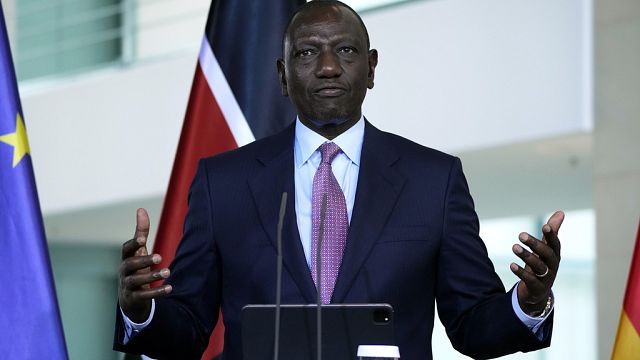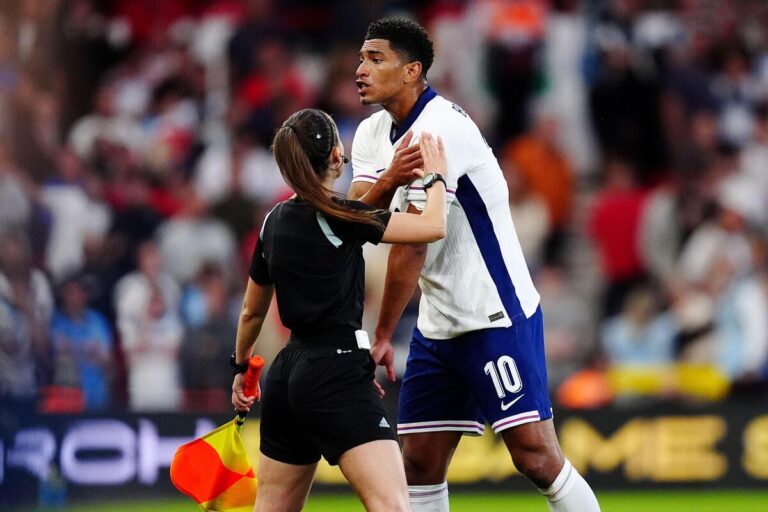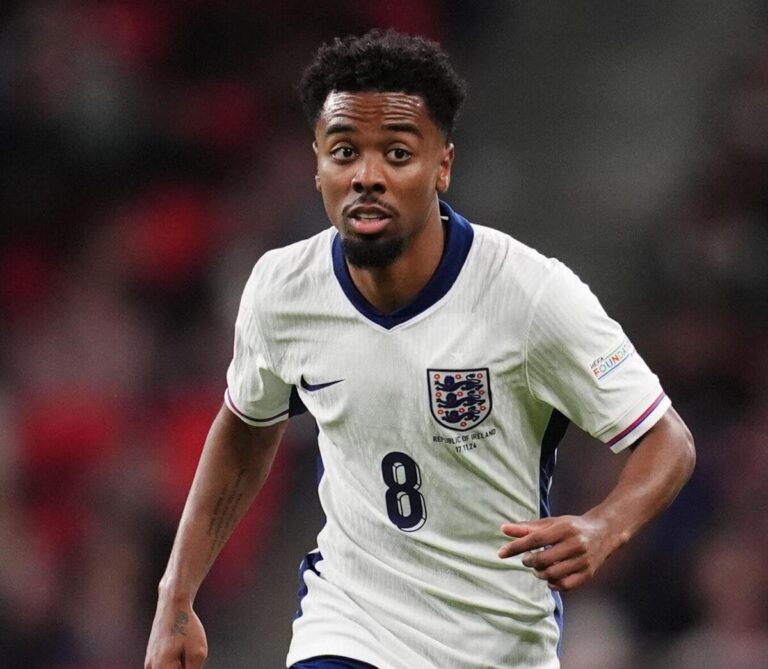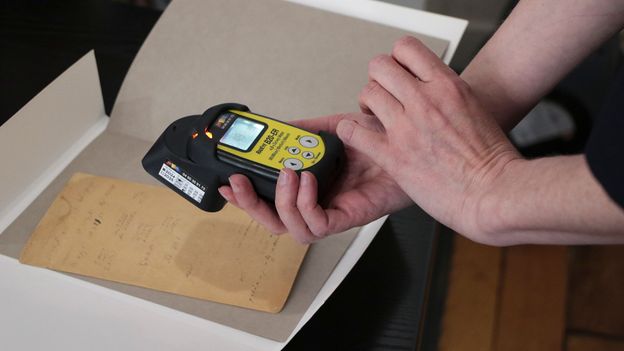Ban on 'no ball games' signs suggested to get kids off screens

Ban on 'no ball games' signs suggested to get kids off screens
Vanessa ClarkeEducation reporter
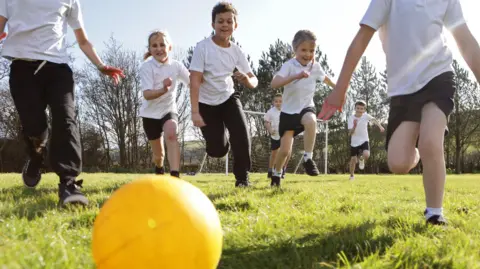 Getty Images
Getty ImagesPlay experts want to ban "no ball games" signs and protect playtime during school breaks, to reduce the time children spend on screens.
They are being forced "indoors on to digital devices", according to the Raising the Nation Play Commission, whose year-long inquiry calls for an end to "anti-play culture".
It warns outdoor play in England has declined by 50% in a generation because of streets dominated by traffic, fear about crime and "public spaces where young people are not welcome".
The government says it is working with experts to develop a framework to improve access to activities outside of school.
The report is calling for a national Play Strategy for England and has made a number of recommendations including:
- A national ban on "no ball games" signs
- Updating planning policy to require developers to consult with children on all new developments
- Government guidance protecting play at break time and lunchtime in schools and banning practices like withdrawing playtime for poor behaviour
- Opening up school playgrounds to the community outside of school hours
- Raising the digital age of consent to 16 and a ban on phones in schools
Chair of the commission, Paul Lindley, says in England "we've made it incredibly hard for children to play".
"Creating truly playful communities is not just about better street design, traffic management, and reduced crime, but also about a reversal of the growing culture of intolerance towards children playing."
In London, there are more than 7,000 signs limiting play for more than half a million children, according to the report.
Some councils are beginning to remove signs amid concerns that children are exercising less.
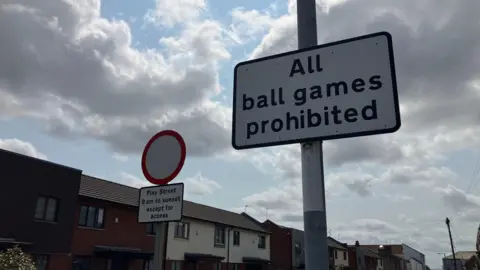 Vanessa Clarke/BBC
Vanessa Clarke/BBC
For Samantha and her four-year-old son Chester, who live in Blackpool, having a playground far away from traffic is vital.
"It's free," she says and it's somewhere her son can play without having to worry "about someone coming to tell him he can't".
"A lot of children are growing up and don't have the opportunity to be able to go to other places or travel, so having somewhere close to home, that is free, is so important."
More than 400 playgrounds closed in England from 2012 to 2022 and annual park budgets have fallen, the report found.
Blackpool Better Start, which helps families with young children like Chester, has been working to transform the city's less used parks and green spaces over the last ten years.
"It is so important for families to have safe spaces to play. Families identify with the park. They feel a sense of ownership and they feel like it belongs to them," director Clare Law explains.

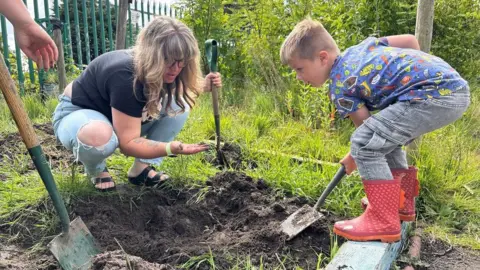 Hayley Clarke/BBC
Hayley Clarke/BBCAnd there are calls for changes in schools too.
In 1995, break times in schools were around 23 minutes longer for young children than they are now, the report found.
The commission wants to see playtime during breaks and lunchtime ringfenced.
Students at St Ambrose Catholic Academy in Liverpool are guaranteed an hour's quality play every day.
Headteacher Tracy Moorcroft says it is a massive part of the school day.
"If they are building, we see them as future architects, if they're in the kitchen, could they be the next future chef? We try to link their play with aspirations for later in life."
But Ms Moorcroft is less convinced about the idea of having "always-active uniforms" which have already been introduced in some schools.
She says the school has "very high standards" for the uniform, as the children are being prepared for life beyond the school.
They get to wear their PE kit some days and wear wellies and coats so they can go outside regardless of the weather.

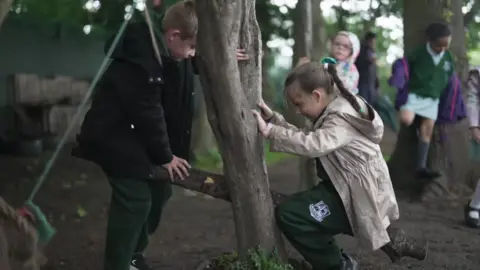 Dan Nelson/BBC
Dan Nelson/BBCGeneral Secretary of the Association of School and College Leaders, Pepe Di'Iasio agrees that playtime has been squeezed "by the drive to improve academic outcomes", but cautioned against an "overly prescriptive approach to play" as this may impact on other areas of the curriculum.
Both Wales and Scotland have already made it a legal requirement for local authorities to ensure enough opportunities for children to play.
The commission in England is calling for a national play strategy with an annual budget of £125m, led by a minister with a responsibility for play.
Baroness Anne Longfield from the Centre for Young Lives think tank, who worked on the report, said it should provide a "blueprint for how we can get children playing again and also tackle the scourge of addictive doom-scrolling".
A government spokesperson said its Plan for Change was "setting young people up to achieve and thrive – both inside and outside the classroom", and that it is investing in grassroots sports facilities and in a programme to help turn "grey school spaces green".
"From July, new rules under the Online Safety Act will require social media platforms to protect children in the UK from seeing harmful content online," the spokesperson added.
Additional reporting by Hayley Clarke and Rahib Khan
What's Your Reaction?
 Like
0
Like
0
 Dislike
0
Dislike
0
 Love
0
Love
0
 Funny
0
Funny
0
 Angry
0
Angry
0
 Sad
0
Sad
0
 Wow
0
Wow
0




